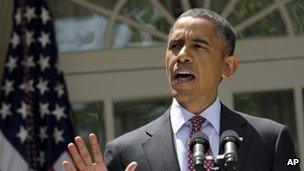President Obama faces tough choices on healthcare
- Published
- comments

Is President Barack Obama's toughest election foe the Supreme Court?
Barack Obama could be about to suffer his worst defeat as president, a humiliation that would go to the heart of the election campaign.
The Supreme Court is expected to rule soon on his changes to America's healthcare system.
Obamacare, as his opponents call it, is hugely controversial. In a recent poll by Rasmussen, external, 53% of Americans say they wanted it scrapped.
But it is President Obama's single biggest domestic achievement. And he chose to do it. He had to deal with the economy. He didn't have to reform the healthcare system.
But providing comprehensive healthcare for all Americans has been a dream of liberals for more than a century, external. Teddy Roosevelt couldn't do it. FDR couldn't do it. The Clintons failed spectacularly. Obama succeeded.
His first year in office was consumed with the struggle. He spent enormous amounts of political capital and rather ruined his reputation as a man who would change the way business was done in Washington, not doing grubby deals.
The Tea Party first became vocal and visible while opposing the changes, and it helped them grow.
Historical court clashes
But now many expect the Supreme Court to rule that either the whole law, or a vital part of it, is unconstitutional. That would be a dramatic political blow to Mr Obama's legacy, credibility and effectiveness. It would leave him with some very hard choices.
The argument centres on the "individual mandate" - weird jargon for an accepted fact of life in most countries, that everyone has to have health insurance, just as in most places everyone has to have car insurance if they want to drive.
But a sizable number of Americans regard this as a grotesque government intrusion into their rights.
Of course, without this provision, insurance companies are loathe to adopt another vital part of the law - that they have to insure everyone, regardless of what medical conditions they have.
Jeff Shesol, former Clinton speech writer and author of a book on FDR's clashes with the Supreme Court, says if his law is struck down, Mr Obama would be in good company.
"It is a fairly common clash in American history between progressive presidents and conservative-minded Supreme Court justices," he says, mentioning that such troubled relationships occurred as far back as Thomas Jefferson, and continued with Andrew Jackson, Abraham Lincoln and both Roosevelts.
"The Supreme Court often suffers a lag between administrations," Mr Shesol says. "President Obama is facing a Supreme Court that was shaped by Ronald Reagan and by both Bushes. You often have the phenomenon where the court represents the past regime."
What now?
There's no doubt that if the Supreme Court does as expected, the initial reactions would be pretty straightforward.
"It's a huge blow to President Obama, and a big boost to the Republicans, particularly to the Tea Party grass roots," says Dean Clancy, a health specialist at Freedomworks, external, a conservative campaign group. "I don't see anyway the president can put a happy face on such an outcome."
But wouldn't it rob the Republicans of one of their main planks in the election campaign, one which really motivates their supporters?
"I think that is a bit like the person who is convicted of shoplifting saying the public prosecutor has a terrible problem because he now has no case to prosecute," Mr Clancy says.
"The healthcare issue will diminish in the sense that it has been resolved, but the American people will now get to make a judgment about the stewardship of the president. So it will be very relevant politically."
It would be a key moment for the president and the campaign. His dilemma would be how to play the defeat and indeed what to promise if he is re-elected.
"There are political consequences but there are huge policy implications as well," Jeff Shesol says. "The question is going to be: 'What are we going to do about it? What do we do about all these Americans who are struggling to afford healthcare?'"
"[Mr Obama] will come forward, I am quite sure, to do something about these Americans. He is not going to leave them to fend for themselves, so that will be a rallying point for the president and his campaign."
That is perhaps easier said than done.
The president can moan about the Supreme Court if he likes, but he can't campaign for a law they have ruled to be unconstitutional.
Arguing that reform is needed is easy in general terms. Designing a replacement that would be universal, but lack an element of compulsion would be extremely hard.
Persuading anyone that if re-elected, he could get such an imaginary scheme past a hostile Congress might prove impossible.
If healthcare is struck down, it will certainly fire up Mr Obama's supporters. But that would be cold comfort for a politician who's just watched his signature achievement gutted or destroyed.